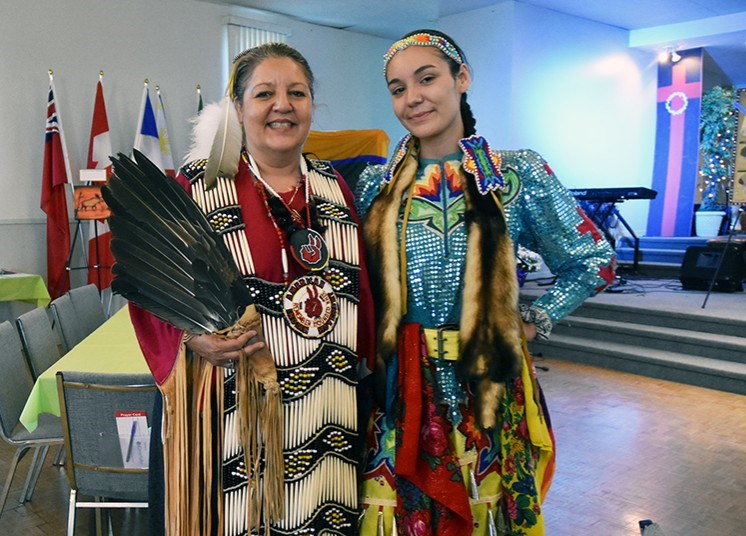BARRIE — Young indigenous women are smart, educated, resilient, spiritual – yet they are still 12 times more likely than their non-indigenous sisters to fall victim to murder.
Since 2011, there have been more than 4,520 missing and murdered indigenous women and girls in Canada.
Those are statistics that tear at the heart of every mother, sister and daughter – and that reflect what has now been called genocide that indigenous people have faced as a result of colonialism.
That was the very personal message that Suzanne Smoke – a woman of the Mississaugas of Rice Lake, Alderville First Nation, executive director of Biindigen Healing and Arts, pipe carrier, sun dancer, and most importantly, mother of a daughter, Cedar Smoke (Ogimaa Geeziko Kwe) – brought to Bradford West Gwillimbury on June 21.
Smoke was the guest speaker at Green Valley Alliance Church’s National Indigenous People’s Day Feast. She spoke of the findings of the Missing and Murdered Indigenous Women inquiry, and of earlier investigations.
“In Thunder Bay, we have an epidemic of our youth, dying,” said Smoke. “There’s racism and there’s hatred – people are going after our children, and they are ending up in rivers, and they have no future.”
The relationship between indigenous and non-indigenous Canadians “is broken,” as a result of not only residential schools, she said, but of the legislation designed to enforce assimilation that up until 50 years ago made it illegal for First Nations people to speak their own language, celebrate their own beliefs, or wear their traditional regalia.
It was not supposed to be that way, Smoke said.
Before the written treaties, long before the Indian Act, the people of the Williams Treaty lands – the so-called "Dish with One Spoon" – had a covenant with white settlers.
The beaded record shows two parallel stripes – one red, one white, representing the equal and parallel journeys of indigenous and white settlers.
“Unfortunately, that two-row wampum was never honoured,” said Smoke.
Instead of respect and the right to “live and worship in our own way,” she said, indigenous people were demonized. The stereotypes were many: “We are barbaric, we are savage, we are pagan.”
Smoke shared traditional teachings that demonstrated the deep spirituality and love of the Creator that underlies indigenous beliefs.
“Everything has spirit. They are all gifts from the Creator,” she said.
Water in particular is sacred.
“What happens to the water happens to us,” she said. “Water will protect you. Water will take care of you” – yet 80 per cent of First Nations “do not have clean drinking water,” and Georgina Island, just on the edge of the Greater Toronto Area, has been under a boil water advisory for three years.
Smoke and her daughter came to the feast to ask those gathered to respect the covenant of the two-row wampum.
“We are here to build those right relationships,” she said. “It’s very important that as we hit reset, we honour that two-row wampum.”
Smoke spoke of the medicine wheel that represents not only the four directions, but the four nations – black, white, yellow and red – “all equal, within that medicine wheel, we are all balanced. We are all equal in Creator’s eyes,” she said. “It’s important that we get back to those teachings. Our communities have suffered greatly.”
Smoke reminded non-indigenous Canadians, “You are our guests here. You are our allies. We call you brothers and sisters… and we ask that you have that respect and love for us and our way. Understand how beautiful and magnificent our culture is.”
It is also resilient. Indigenous people faced the loss of their lands and culture, as a result of the trauma and abuse suffered at residential schools – the last of which was closed only in 1996, she said. It’s a trauma that has become “intergenerational,” impacting the children of residential-school survivors, and their children.
“We need to understand the impact of colonialization,” she said. “Canadians have a lot of reconciling to do.”
The 633 First Nations in Ontario own less than two per cent of the land, and “we are begging for crumbs,” Smoke said. “This is our lived experience.”
How can Canadians work towards reconciliation?
“Open your hearts and open our minds, and hit reset on who we are,” Smoke said. “Help each other to understand the impact… Ride side by side as in the original two-row wampum. We ask that you give us that respect. This imbalance needs to change.
“We have a long road ahead of us. We have a lot of work. Reach out in love and kindness.”
Mayor Rob Keffer attended the feast, and urged residents “to continue that journey of understanding, and better right the wrongs.” He praised Green Valley Alliance Church for “showing such leadership in our community.”
The evening included a dinner – featuring some of the foods that were traditional to indigenous people, including corn, squash and wild rice – and a silent auction, raising funds for summer youth programs at the remote northern first nations community of Mishkeegogamang.
“Things are improving,” said Paul Burston, founder of True North Partnership, who has been working with the people of Mishkeegogamang for 18 years. “In my view, they’re not improving fast enough. What’s reconciliation? It’s relationship. It’s mutual respect.”
